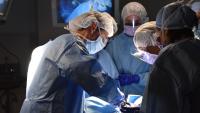Simulation Programs

We work with faculty to develop the most comprehensive course curriculum for our medical students. We also partner with industry leaders and New York Presbyterian staff to host advanced surgical skills labs. All guests have access to our world class facility, equipment, and diverse knowledge base.
Student Simulation Curriculum
Each Columbia University medical student will spend approximately 60 hours in the Simulation Center during their 4 year curriculum. Our comprehensive courses guide our students through interactions with standardized patients, high-fidelity manikins, skills based task trainers and software based virtual trainers.
- 1st Year, 1st Semester
Once students enter medical school they have an opportunity to begin interacting with standardized patients within the first month in small groups. These courses are a part of the “Seminars” curriculum, and teach medical students how to interview and communicate with patients of varying ages and demographics. These sessions are designed for a high level of faculty engagement to ensure students learn correct techniques and communication skills. - 1st Year, 2nd Semester
Students continue using standardized patients to learn Motivational Interviewing techniques. In addition to these sessions, we introduce physical exam maneuvers in the “Tutorial” curriculum. This full semester program integrates communication skills to begin preparing the students for interactions with real patients on hospital rotations and bedside rounds. - 2nd Year, 1st Semester
Building on the first year's courses, students are introduced to more difficult standardized patient scenarios. These topics include domestic violence, substance abuse, and breaking bad news. It is during this semester students begin to prepare for their Major Clinical Year (Hospital Rotations). - Major Clinical Year (2nd Year, 2nd Semester and 3rd Year, 1st Semester)
During the Major Clinical Year the students have an opportunity to interact with standardized patients during every major clerkship: Neurology, Psychology, Medicine, OB/GYN, Primary Care, and Pediatrics. These cases are designed to test students on key components unique to each rotation. They also begin utilizing High-Fidelity Simulators to diagnose and treat various medical cases in a safe environment. Students will participate in the Step 2 CS Prep Program which prepares them for the Step 2 CS exam with 10 unique standardized patient cases. - 3rd Year, 2nd Semester, and 4th Year
As students complete their Major Clinical Year and begin the last year and a half of medical school they return to the Simulation Center to complete courses and practice skills specific to their specialties of choice. In addition every medical student will rotate through the Simulation Center as part of the Ready for Residency curriculum. This program consists of High-Fidelity Simulations (which incorporates the AHA ACLS curriculum) and Task Training sessions that are geared toward preparing the students for their first year of residency.
NewYork-Presbyterian Partners
The Mary and Michael Jaharis Simulation Center is proud of its relationship with New York Presbyterian's Milstein, Allen, and CHONY hospitals. Our unique partnership allows us to offer continued professional development and training to all departments and ranks, from nurses to physician assistants, residents and surgeons. We help to develop comprehensive programs using the latest innovations in diagnostic equipment and surgical procedures.
To schedule a course with us, please complete our Simulation Center Course Request Form.
Industry Labs
The Mary and Michael Jaharis Simulation Center collaborates with industry innovators to support surgical skills labs. We offer an array of versatile conference and clinical spaces perfect for hosting your next professional education event. To start planning your next event with us, please complete our Simulation Center Course Request Form.
Standardized Patients
Our standardized patients are selected from a pool of the most highly trained actors and actresses from the New York City region. Simulation Center staff and faculty then teach them case-specific symptoms so students are able to recognize, diagnose, and recommend treatment for medical conditions. These interactions are part of our OSCE's (observed structured clinical exams), which are integrated into all 4 years of the medical school curriculum.
Standardized patients also play an important role during in-situ scenarios at New York Presbyterian Hospital, where they assist with resident training.
If you are interested in being considered for work as a standardized patient please fill out our Standardized Patient Application.